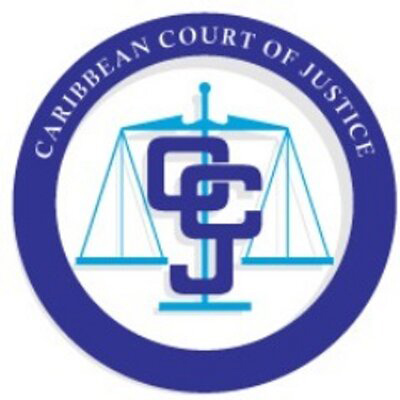The Caribbean Court of Justice (CCJ) yesterday ruled that the Guyana Court of Appeal has no jurisdiction to hear the appeal of a decision by acting Chief Justice Roxane George SC to throw out an APNU+AFC election petition challenging the results of the March 2nd 2020 polls.
In a majority judgment, the Trinidad-based court of last resort for Guyana has found, among other things, that although the petition was not been determined on its merits, the decision to throw it out it cannot be appealed and so the local appellate court cannot entertain such a challenge.
The ruling means that the petition – one of two lodged on behalf of APNU+AFC – has been completely lost.

On December 21st last, Guyana’s Court of Appeal by a majority 2 to 1 decision ruled that it had jurisdiction to hear the appeal of the decision to throw out the petition. Chancellor Yonette Cummings-Edwards and Justice of Appeal Dawn Gregory concurred with each other, while Justice of Appeal, Rishi Persaud had dissented.
Chief Justice George had previously thrown out the petition, after finding that the presidential candidate of the APNU+AFC, David Granger, who was a “proper and necessary party” to the petition had not been served on time.
Lawyers for petitioners Monica Thomas and Brennan Nurse, however, appealed to the Court of Appeal, which they vehemently argued had rightly assumed jurisdiction to hear the matter because the law allowed it.
Vice President Bharrat Jagdeo and Attorney General Anil Nandlall SC would later challenge the Guyana Court of Appeal giving itself jurisdiction to hear the appeal, arguing before the CCJ that because the petition had not been determined on its merits, the local appellate court had no jurisdiction to hear the matter.
No right of appeal
Justice Winston Anderson, who read the CCJ’s ruling, said that the overarching issue to be determined was whether Guyana’s Court of Appeal was correct in holding that it had jurisdiction to hear an appeal in the particular circumstance where the petition was dismissed for the late service.
He, however, noted that the apex court found that there are three possible grounds on which the Court of Appeal could have had jurisdiction, but that none existed in this case.
Justice Anderson said that such jurisdiction is derived under Article 163 of the Constitution, and the National Assembly (Vali-dity of Elections) Act and Rules, which establish a comprehensive regime for an elections petition.
On this point, he noted that the petition had to be determined in accordance with that framework, which the Court found to be lacking.
Justice Anderson said that in light of the service timeframe on Granger having been breached and the petition then resultantly being declared a nullity by the High Court, which is vested with exclusive jurisdiction to hear such challenges, it then “could not be accepted that proceedings which began in the High Court under this exclusive, exclusionary and special jurisdiction for dealing with elections petitions suddenly transmogrified into ordinary civil law proceedings on appeal.”
Justice Anderson went on to say that “neither is it permissible to depart from or import into, by implication, a jurisdiction not created in the Article.”
The Court emphasized that Article 163 (3) circumscribes the right to appeal decisions of the High Court in elections petitions to only two circumstances and noted that striking out the petition for want of timely service fell into neither of the two allowed, and thus no appeal was possible.
Regarding the Court of Appeal’s reliance on its own Act by which it gave itself jurisdiction, Justice Anderson said that general provisions of a statute must yield to specific provisions, adding that any tension between Article 163 of the Constitution and Section 6 (2) of the Court of Appeal Act concerning the election jurisdiction “must naturally be resolved in favour of the Constitution.”
Article 163 (3) provides, “An appeal shall lie to the Court of Appeal – from the decision of a judge of the High Court granting or refusing leave to institute proceedings for the determination of any question in paragraph (1).”
Justice Anderson noted that there may be an exception to the rule as to the Court of Appeal’s jurisdiction in order to maintain the integrity of the Constitution and opined that procedural and substantive errors may be a basis for arguing that there should be a right of appeal to the Court of Appeal, but that the threshold for making such an argument “is necessarily very high.”
He noted, however, that in the case at bar, there was no real suggestion from the petitioners that the Chief Justice’s decision dismissing the petition for want of proper service could support an argument that could justify invocation of the exception.
The Court noted that the Chief Justice’s order dismissing the petition, having been an order made in chambers, and in accordance with the Court of Appeal, is placed in the same statutory boat as an order made in summary proceedings where no right is given to appeal to the Court of Appeal.
“The result must be that the purported appeal” by the petitioners “against the dismissal by the Chief Justice of the petition as a nullity is itself a nullity because there was no right of appeal to the Court of Appeal,” Justice Anderson read from the judgment.
Full Court
Justices Peter Jamadar and Denys Barrow who concurred with each other, but dissented from the majority of the Court expressed the view that an appeal of such a decision does not lie to the Court of Appeal, but rather to the Full Court.
To support his contention, the court heard Justice Jamadar’s view that Section 42 of the National Assembly (Validity of Elections) Act “could be constitutionally reimagined and reinterpreted by liberating the meaning of “subject” from it colonial mindset.”
He said that by so doing, “Section 42 becomes accommodating of a more permissive, purposive and inclusive interpretation and application that permits an appeal to the Full Court”.
Section 42 provides, “The Court shall, subject to this Act and rules of court, have the same powers, jurisdiction and authority with respect to any proceedings brought under or by virtue of this Act as if the proceedings were an ordinary action within the jurisdiction of the Court, and without prejudice to the generality of the foregoing provisions of this section, may exercise the power of the Court to consolidate hearings in relation to the hearing of any such proceedings and any proceedings in respect of any election of members of a regional democratic council where the elections in respect of which all the proceedings have been brought were held on the same day.”
The majority of the Bench, however, comprising Justices Anderson, Jacob Wit and Maureen Rajnauth-Lee overturned the decision of the Court of Appeal giving itself jurisdiction to hear the case.
The Court then ordered that each party will bear their own costs.
The petition is one of two filed by the Opposition APNU+AFC which challenged the results of the March 2nd, 2020 general elections. The other petition is currently before the Court of Appeal.
With the petition having not been determined on its merits, the Attorney General and Senior Counsel Douglas Mendes for Jagdeo had argued that the petition could not be appealed to the Guyana Court of Appeal which in the circumstances would have had no jurisdiction.
Senior Counsel John Jeremie for Thomas and Nurse had strongly refuted those arguments, advancing their stance that the local appellate court had rightly assumed jurisdiction because the law so allowed.
Nandlall and Mendes had argued that since Chief Justice George’s decision was not in relation to a final order of the Court, it was incapable of being appealed and that the Guyana Court of Appeal therefore has no jurisdiction to hear the matter.
Their contention was that the purported appeal falls outside of the requirements created in Article 163(3) and for that reason there is in the first place no appeal.
They advanced that in accordance therewith, an appeal could only have been permitted if the substantive petition had been heard in its entirety in accordance with Article 163(1), which requires the determination of specific questions on the full hearing of the substantive petition on its merits.
Nandlall had argued that the Guyana Court of Appeal’s reliance on the conventional provisions of its own Act and Article 163(3), was misplaced.
Mendes had said that Article 163(3), in the context of an election petition allows for an appeal to the Court of Appeal, only where the specific questions in 163(1) would have been fully heard and determined in the petition.
He said that the specific reference to “leave” in 163(3) without any provision requiring a party to apply for leave, could have been that the framers of the Constitution assumed “that there was a requirement somewhere,” that an application could be made for leave.
From that assumption, he said, it could have been the reason that the framers then said that if leave was refused or granted then there would be a right of appeal to the Court of Appeal, which he said would then be consistent with subsection (b) of 163(3), which he argued requires the appeal to be from a full and final determination of the questions listed in 163(1).
He had said that by implication, this would then exclude appeals on any question not relating to the merits of the petition.
Jeremie, in his rebuttal address to the court, held to the ruling made by the Court of Appeal, that not only did its own Act allowing a right of appeal operate, but 163(3) as well, which provides for such leave, as was the ruling of that court.
To the arguments advanced on behalf of the Appellants that there is no appeal for want of the questions in 163(1) not having been determined, Jeremie said that Article 163(3) ought to be given a wider interpretation for appeals to be allowed where the petition is not determined on its merits.
He had urged the CCJ to so find, while advancing that Article 163(3) had to be read in tandem with Article 123(1), which provides for a Supreme Court and a Court of Appeal with powers conferred on each respectively.
As was his team’s position before the lower court, Jeremie maintained that the local appellate court has jurisdiction to hear the appeal and was right in so finding.
Thomas and Nurse’s contention had been that the elections were unlawfully conducted and/or that the results (if lawfully conducted) were affected or might have been affected by unlawful acts or omissions.
They nonetheless argued that from those polls it is Granger who should have been declared the duly-elected President of Guyana.





